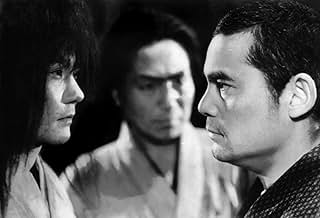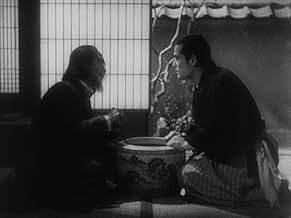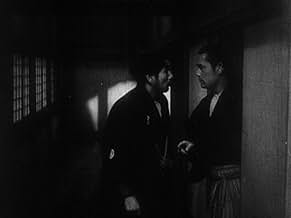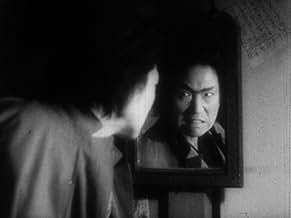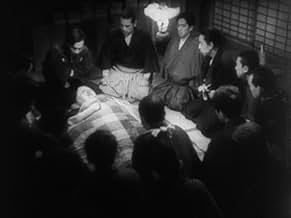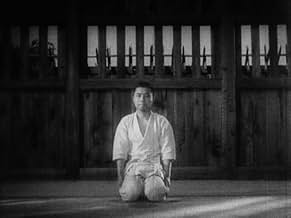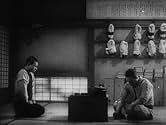IMDb-BEWERTUNG
6,0/10
2958
IHRE BEWERTUNG
Füge eine Handlung in deiner Sprache hinzuSugata returns to prove his judo mastery in a match against Western opponents.Sugata returns to prove his judo mastery in a match against Western opponents.Sugata returns to prove his judo mastery in a match against Western opponents.
- Regie
- Drehbuch
- Hauptbesetzung
Kô Ishida
- Daisuburo Hidarimonji
- (as Ko Ishida)
Osman Yusuf
- American Sailor
- (as Osman Yusef)
Empfohlene Bewertungen
I have seen every Akira Kurosawa movie available on VHS or DVD and this is the first "bad" one among them. In fact, I will be so bold as to say I doubt he really directed it. His name is on the credits but I don't see a shred of him in the work. No environmentally framed shots, no contrasts of light and dark, no horizon dividing the frames. He must have done this one with a week of shooting time or a budget of 50 Yen. The comical fight between the Judo stylist and Karate stylist literally made me laugh out loud. It looked like parody. Nothing like the climatic fight in the first Sugata Sanshiro. Also the subtitles were apparently done by someone in China who could speak a little Japanese and a little English. They use the word "karate" for both karate and judo, and since the main conflict is between the two styles, you'd better pay attention to who's doing the the talking or you'll never follow the plot. The movie just about "braked" me.
Sanshiro Sugata 2 (1945)
** 1/2 (out of 4)
Kurosawa's sequel has Sugata (Susumu Fujita) still growing in the world of judo but outsiders are wanting to make the fighting style a sport and put it up against American boxing. This is a rather strange film but I do think it's better than the original just because of how out there it is. I've read that the government forced Kurosawa into making this and you can tell because that plays a part in the film. American boxing is really looked down upon and fighting as a sport is shown to be evil and this really translates to Kurosawa being unhappy as he was forced to make this just like the characters here are being forced to do something they see as morally wrong. Seeing the different fighting styles mixed up together was pretty fun as was the ending, which takes place during a snow storm. Fujita is a lot better here than he was in the previous film and really delivers a strong performance and makes his character quite memorable with the difficulties that he faces. The film's biggest problem comes in form of some rather choppy storytelling that has the film wonder off from its main goal way too many times and this is certainly true in the final fifteen-minutes before the final showdown. The low-budget nature of the film also shines through in a negative way but I'm sure the fans of the director will want to watch this at least once.
** 1/2 (out of 4)
Kurosawa's sequel has Sugata (Susumu Fujita) still growing in the world of judo but outsiders are wanting to make the fighting style a sport and put it up against American boxing. This is a rather strange film but I do think it's better than the original just because of how out there it is. I've read that the government forced Kurosawa into making this and you can tell because that plays a part in the film. American boxing is really looked down upon and fighting as a sport is shown to be evil and this really translates to Kurosawa being unhappy as he was forced to make this just like the characters here are being forced to do something they see as morally wrong. Seeing the different fighting styles mixed up together was pretty fun as was the ending, which takes place during a snow storm. Fujita is a lot better here than he was in the previous film and really delivers a strong performance and makes his character quite memorable with the difficulties that he faces. The film's biggest problem comes in form of some rather choppy storytelling that has the film wonder off from its main goal way too many times and this is certainly true in the final fifteen-minutes before the final showdown. The low-budget nature of the film also shines through in a negative way but I'm sure the fans of the director will want to watch this at least once.
Due to its anti-American content, this film was never released in the US. Released in late 1945, in the early days of the American occupation of Japan, the movie has a strong anti-American slant. One of the two parallel plots of the film involves the young judo hero, Chee, and his battle to preserve the sanctity of the Japanese arts against the encroaching, brutish influence of American boxing. Americans are portrayed as a bunch of creeps. Eventually, Chee vanquishes the American champion to the wild cheers of his countrymen. This is by far the most interesting material in the film.
The judo vs boxing plot runs alongside a more pedestrian story: Chee is challenged by the brother of the karate master he vanquished at the finale of the original film. This story is a virtual carbon copy of the original, but with few of the original's charming nuances. The climactic final battle -- which takes place on a snow-covered moutainside -- is a pale imitation of the original's finale, which took place in a field of high grass.
The film also suffers from some of the same choppiness and fuzziness of narrative line that affected the original film, and a few other of Kurosawa's early works. Still, it's an entertaining effort. And it's remarkable as one of only two sequels Kurosawa ever filmed (the other being SANJURO, his follow-up to YOJIMBO). It appears Kurosawa learned from the experience of making SSP2 -- SANJURO is much more different from YOJIMBO than SSP2 is from its original, and a far more effective film than SSP2.
The judo vs boxing plot runs alongside a more pedestrian story: Chee is challenged by the brother of the karate master he vanquished at the finale of the original film. This story is a virtual carbon copy of the original, but with few of the original's charming nuances. The climactic final battle -- which takes place on a snow-covered moutainside -- is a pale imitation of the original's finale, which took place in a field of high grass.
The film also suffers from some of the same choppiness and fuzziness of narrative line that affected the original film, and a few other of Kurosawa's early works. Still, it's an entertaining effort. And it's remarkable as one of only two sequels Kurosawa ever filmed (the other being SANJURO, his follow-up to YOJIMBO). It appears Kurosawa learned from the experience of making SSP2 -- SANJURO is much more different from YOJIMBO than SSP2 is from its original, and a far more effective film than SSP2.
Akira Kurosawa's third film, released a year after The Most Beautiful (which he made for his wife) (actually, if it weren't for the lousy search function of Douban, there'd be no need to repeat this sort of objective reality in a review).
Akira Kurosawa himself, in his autobiography "Toad's Oil", doesn't seem to recognize much of the cinematic value of this "sequel to Zizan Sanshiro", which coincides with the popular aesthetic, the biggest criticism being the lyrical patriotism, similar to that in the modern-day Ip Man, an element that was loathed in the movies 60 years ago, and is still the case 60 years later. It's just obvious that the director, who has influenced Western cinema many times over in terms of casting and dramatization, naturally has his own insights. In the "Zi San Shiro sequel" will rarely see so involved, Kurosawa has shot, so low mobilization of nerves of film and television subject matter, at this point, I think the domestic film and television industry is still worth looking back at history to learn.
But the master is a master, after all, in the "Zi San Shiro sequel" we did not see colorful on that bad bridge too much continuation, but is point to the end, in the end oriented to the benevolence of the evil of revenge on the ending. It's as if when countless critics were giddy as if they were watching this talented Japanese director have some cracks in him, Akira Kurosawa once again backtracked on the theme of human kindness so that his early style wouldn't be so clearly labeled as patriotic.
Even now, as a director who has just made two movies, in his early work has revealed extremely artistic light and composition, in dealing with multiple people standing, not only makes people wonder if Antonioni has come here to steal the division.
Akira Kurosawa himself, in his autobiography "Toad's Oil", doesn't seem to recognize much of the cinematic value of this "sequel to Zizan Sanshiro", which coincides with the popular aesthetic, the biggest criticism being the lyrical patriotism, similar to that in the modern-day Ip Man, an element that was loathed in the movies 60 years ago, and is still the case 60 years later. It's just obvious that the director, who has influenced Western cinema many times over in terms of casting and dramatization, naturally has his own insights. In the "Zi San Shiro sequel" will rarely see so involved, Kurosawa has shot, so low mobilization of nerves of film and television subject matter, at this point, I think the domestic film and television industry is still worth looking back at history to learn.
But the master is a master, after all, in the "Zi San Shiro sequel" we did not see colorful on that bad bridge too much continuation, but is point to the end, in the end oriented to the benevolence of the evil of revenge on the ending. It's as if when countless critics were giddy as if they were watching this talented Japanese director have some cracks in him, Akira Kurosawa once again backtracked on the theme of human kindness so that his early style wouldn't be so clearly labeled as patriotic.
Even now, as a director who has just made two movies, in his early work has revealed extremely artistic light and composition, in dealing with multiple people standing, not only makes people wonder if Antonioni has come here to steal the division.
Though not impressed with the original Sanshiro Sugata I did consider it a noteworthy film in Japanese movie history and certainly had its charm.
The sequel see's our judo fighter hero presented with further foes he must vanquish and more moral dilemmas. Ontop of this he finds himself pressured into participating in an east vs west/boxing vs judo bout.
This sequel was heavily criticized and considered a propaganda film (Of which there were many around this time coming out of Japan). Truth be told I don't understand why or how this could be considered such, there was no military/political motivation to be found.
Inferior to the original? Yes, but not by much. The Sanshiro Sugata movies have their merits but don't deserve (In my opinion) the critical acclaim they recieved. I'm curious what happened with the sequels and quite look forward to finding out.
The Good:
Follows on from the original well
The Bad:
Looks dated even for its time
Things I Learnt From This Movie:
Susumu Fujita was reincarnated as Mark Dacascos
Fighting barefoot in the snow for real, there should be an oscar category for such feats!
The sequel see's our judo fighter hero presented with further foes he must vanquish and more moral dilemmas. Ontop of this he finds himself pressured into participating in an east vs west/boxing vs judo bout.
This sequel was heavily criticized and considered a propaganda film (Of which there were many around this time coming out of Japan). Truth be told I don't understand why or how this could be considered such, there was no military/political motivation to be found.
Inferior to the original? Yes, but not by much. The Sanshiro Sugata movies have their merits but don't deserve (In my opinion) the critical acclaim they recieved. I'm curious what happened with the sequels and quite look forward to finding out.
The Good:
Follows on from the original well
The Bad:
Looks dated even for its time
Things I Learnt From This Movie:
Susumu Fujita was reincarnated as Mark Dacascos
Fighting barefoot in the snow for real, there should be an oscar category for such feats!
Wusstest du schon
- WissenswertesThe final fight scene was filmed outdoors in real snow. Susumu Fujita, fighting barefoot, had to be carried to a bonfire between each shot as his feet would go numb.
- VerbindungenFollows Die Legende vom großen Judo (1943)
Top-Auswahl
Melde dich zum Bewerten an und greife auf die Watchlist für personalisierte Empfehlungen zu.
- How long is Sanshiro Sugata, Part Two?Powered by Alexa
Details
- Erscheinungsdatum
- Herkunftsland
- Sprache
- Auch bekannt als
- Sanshiro Sugata, Part Two
- Drehorte
- Toho Studios, Tokio, Japan(Studio)
- Produktionsfirma
- Weitere beteiligte Unternehmen bei IMDbPro anzeigen
- Laufzeit
- 1 Std. 23 Min.(83 min)
- Farbe
- Sound-Mix
- Seitenverhältnis
- 1.37 : 1
Zu dieser Seite beitragen
Bearbeitung vorschlagen oder fehlenden Inhalt hinzufügen

